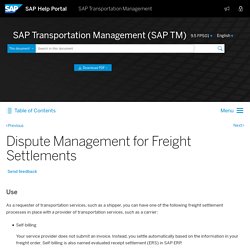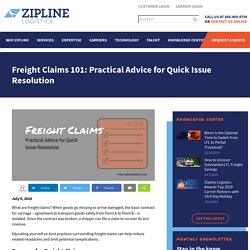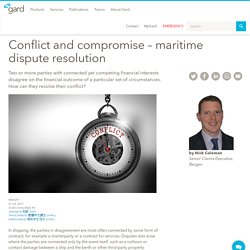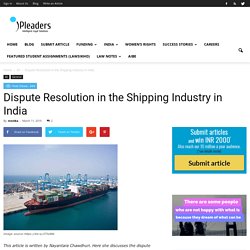

Expéditeurs, Transporteurs : quelles indemnités êtes-vous en droit de demander? – Le blog de Chronotruck. Expéditeurs, Transporteurs : quelles indemnités êtes-vous en droit de réclamer?

Dans nos articles précédents, nous rappelions les responsabilités de chacun, donneur d’ordre ou transporteur, dans le cadre du Contrat Général de Transport Routier de Marchandises et les précautions à prendre pour bien veiller à ce que ces responsabilités soient respectées. En cas de manquement ou de problème, nous détaillons maintenant les indemnités auxquelles vous pouvez prétendre ou que vous devez à l’autre partie dans le cadre du contrat. De façon générale, on peut synthétiser les litiges et donc ces indemnités en trois grands types : Les immobilisations injustifiées de ressources pour l’une des parties (généralement dues à des retards)Les opérations supplémentaires non prévues lors du devisLes atteintes aux biens (ou plus rarement aux personnes) Cela arrive malheureusement et le responsable n’est pas toujours celui qu’on croit.
Procédure traitement des litiges national Altimium 01052017. Mediationinshipping. Limites de responsabilités marchandises. Dealing With Disputes Freight. Bell and toles chapter. Les contentieux en transport maritime de marchandises. Comment préparer une réclamation 8 Freight Claims Tips to Ensure You Get the Full Amount Paid. Linkedin Facebook Google-plus Twitter Pinterest Instagram Youtube Rss Learn More: Contact Cerasis Login Menu Schedule a Pick Up – 1-800-734-5351 Ext. 5 8 Freight Claims Tips to Ensure You Get the Full Amount Paid Share This Article - >> Share on facebook Share on twitter Share on linkedin Share on pinterest Share on reddit Share on email Share on print Many companies who ship freight make costly mistakes when handling freight claims. 8 Freight Claims Tips to Ensure the Claim Gets Paid 1.

Make a note of any damage or shortages on the Bill of Lading (BOL) all exceptions should be noted. Example of an exception is “one box damaged”. In the LTL world there are provisions for hidden damage but this is still difficult to win. When your freight is lost or damaged upon arrival, it is important to give attention to the issue immediately. 2. Never discard the damaged freight until the claim has been resolved to satisfaction. The carrier has a right to salvage. 3. 4. 5. 6. 7. 8. Summary Adam Robinson. Dispute Management for Freight Settlements - SAP Help Portal. As a requester of transportation services, such as a shipper, you can have one of the following freight settlement processes in place with a provider of transportation services, such as a carrier: Self-billing Your service provider does not submit an invoice.

Instead, you settle automatically based on the information in your freight order. Self-billing is also named evaluated receipt settlement (ERS) in SAP ERP. Submission of an invoice by the service provider You pay the service provider the amount contained in the invoice. In both processes, you can have differences and potential disputes between what you expect to pay against what the service provider expects to be paid.
In SAP Transportation Management (SAP TM), you can use the following settlement processes: Freight Claims 101: Practical Advice for Quick Issue Resolution. 22 Shares Share Tweet Email July 9, 2018 What are freight claims?

Educating yourself on best practices surrounding freight claims can help reduce related headaches and limit potential complications. Transportation Disputes: Can Arbitration Deliver the Goods? Procédure traitement des litiges national Altimium 01052017. Mediationinshipping. Conflict and compromise – maritime dispute resolution - GARD. In shipping, the parties in disagreement are most often connected by some form of contract, for example a charterparty or a contract for services.

Disputes also arise where the parties are connected only by the event itself, such as a collision or contact damage between a ship and the berth or other third-party property. Shipping disputes can range from simple matters solved quickly through amicable discussions to complex, multi-jurisdictional legal actions worth millions of dollars. The following is an overview of the different methods available for solving disputes, including their advantages and the situations for which they may be best suited. Factors influencing the selection of dispute resolution method The methods through which such disputes are resolved can vary considerably and their success is dependent on various factors, including: The majority of disputes evolve from an underlying contract in which an agreed dispute resolution mechanism is precisely spelled out.
Mediation. Dispute resolution in the shipping or maritime industry in India. This article is written by Nayantara Chawdhuri.

Here she discusses the dispute resolution in the shipping industry in India. The maritime industry is a dynamic one, where the business does not progress in a linear manner and on account of damage, delays, and disasters, disputes come up thick and fast. Shipping law can be plainly divided into contentious and non-contentious spheres. The non-contentious aspects of shipping law would be contained within transactional work.
Further, disputes can be classifiable either as wet disputes or dry disputes, as shall be looked into later in this essay. International arbitration is the often-chosen route for dispute resolution in the maritime industry. Further, maritime dispute settlements often entail huge sums of money and warrant sound decision-making on technical and rather arcane issues. Accidents involve serious questions. Why is a bill of lading a document of significance? What are the different types of bills of lading one might find?